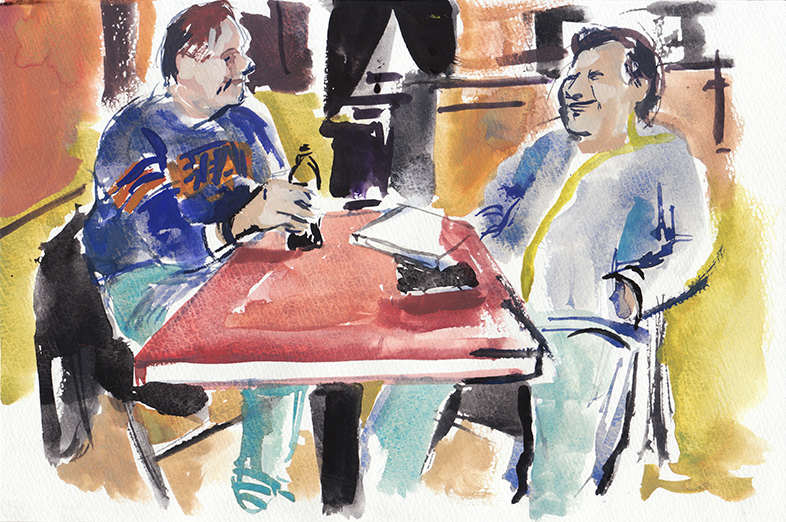Huddling from the wind in a doorway across from a transient hotel in the northern tip of Boystown, I pressed the second-floor buzzer.
A giggling pixie of a young woman opened the door and wordlessly flitted upstairs for me to follow. Pausing only to peek back and giggle, she gamboled up the stairs, finally gesturing me to walk through a doorway.
I walked into a plain, white room with a hundred purple roses hanging upside down from the ceiling. Ten slim white men stood in a cluster in the center. Women in the auditorium seats were giving them instructions.
Everyone turned to stare at me. I turned to stare at my silent pixie, who looked back with a horrified expression.
“I think you’re in the wrong place,” she said.
Here’s where Ben Hecht’s legacy lives too.
After the confusion was cleared and it was revealed I was not an actor late for rehearsal for Strawdog Theatre’s show “Big Love” (tickets on sale now!), I found myself in the theater’s empty cabaret area at a table with Strawdog’s Anderson Lawfer and Mike Dailey.
“Three white guys who look exactly the same,” Dailey joked as we sat down.
Lawfer and Dailey are creating a radio play version of “1001 Afternoons in Chicago,” the 1920s newspaper column that inspired this site.
The pair were introduced to the idea when Seth Boustead of Access Contemporary Music sent a Facebook message to see if they would be interested in scripting plays to go along with music he and fellow composer Amos Gillespie planned to write about Hecht’s short vignettes of 1920s Chicago life.
(I sat down with Boustead in March and will link to that below. “Hunting Ben Hecht, Part 3″ will be sitting in on a rehearsal; part 4 will cover the play itself.)
Lawfer and Dailey are two of the five Strawdog writers turning Hecht pieces into plays. Framed through “Grass Figures,” Hecht’s meditation on people laying on the grass in Grant Park, the show will weave together stories like “Don Quixote and His Last Windmill” and “Dapper Pete and the Sucker Play.”
“Ben Hecht” will stay in Grant Park watching the people laying on the grass. “The Reporter,” which was how Hecht referred to himself in the column, will walk into the worlds of each story.
“Early on, Andy and kind of agreed we want to pick pieces and cut them out in such a way that the focus is as much as possible on the voices of the the people he is talking to,” Dailey said. “So like ‘Dapper Pete’ is one where it’s almost entirely the character talking. There are quite a few of those. ‘The Man From Yesterday’ was another one — we’re not doing that one — but that was another option. And we also try to get a little variety. ‘The Lotharios’? What is it?
“‘Thumbnail Lotharios,’” Lawfer softly added, fiddling with the electronic cigarette he puffed through our discussion.
“‘Thumbnail Lotharios.’ That’s another one,” Dailey said.
Theatrical screams erupted from the room with the hanging purple roses.
The five writers, two composers, full cast and small orchestra will take Hecht’s suicidal businessmen, conned con artists and seductive manicurists and put them into live-action modern radio plays, a space where Dailey and Lawfer shine.
Thanks to Picklebot.
“We have a Strawdog initiative called The Hit Factory — modestly named ‘The Hit Factory’ — where everyone in the Strawdog ensemble is encouraged to write radio plays,” Lawfer said. “Mike and I, for example have written I think six now together called ‘Picklebot and Lawfer.’ Picklebot is a pickle-joke-telling robot and Lawfer, who’s me, we tour around fighting crimes.”
“And usually save the world,” Dailey said.
“Like three times an episode,” Lawfer said.
The troupe’s “wirelesses,” as they initially called the radio plays, started around 2002. Lawfer and Dailey always stayed with comedy (although Dailey said Picklebot hasn’t told a pickle joke in about a decade).
Other troupe members went darker with their wirelesses, telling the adventures of Doctor Night or writing about George Reeves, the real-life actor who played Superman in the 1950s TV show and died of a self-inflicted gunshot wound.
Although the wirelesses died when The Hit Factory started in 2007, Strawdog does about three radio or radio-style pieces a year, Lawfer said. The most recent was “Kill Shakespeare,” where the audience watched images of the comic book that inspired the play. That was the first collaboration with Boustead and the AMC.
They were excited, these two men at a cabaret table on a dark night in north Boystown. They were excited as one sipped Diet Coke and the other puffed an electronic cigarette. They were excited about the possibilities of merging radio and orchestra, about putting their own spin on this cultural artifact.
They were excited about Ben Hecht.
“I went through some addiction issues, some things in my life a few years ago,” Lawfer said, leaning in and pocketing the cigarillo-shaped electronic cigarette. “Once I started cleaning myself up, for some reason this city became part of my well-being. Feeling connected to Chicago and to the community has been a huge part of my recovery, personally.
“There’s something about the humanity in this book compared to any of the others about Chicago where he describes the architecture and the poor people and the rich people and he loves everyone equally, for some reason has been a huge inspiration,” Lawfer said.
“1001 Afternoons in Chicago” debuts May 21.
Read Part 1 of this story, an interview with one of the composers
